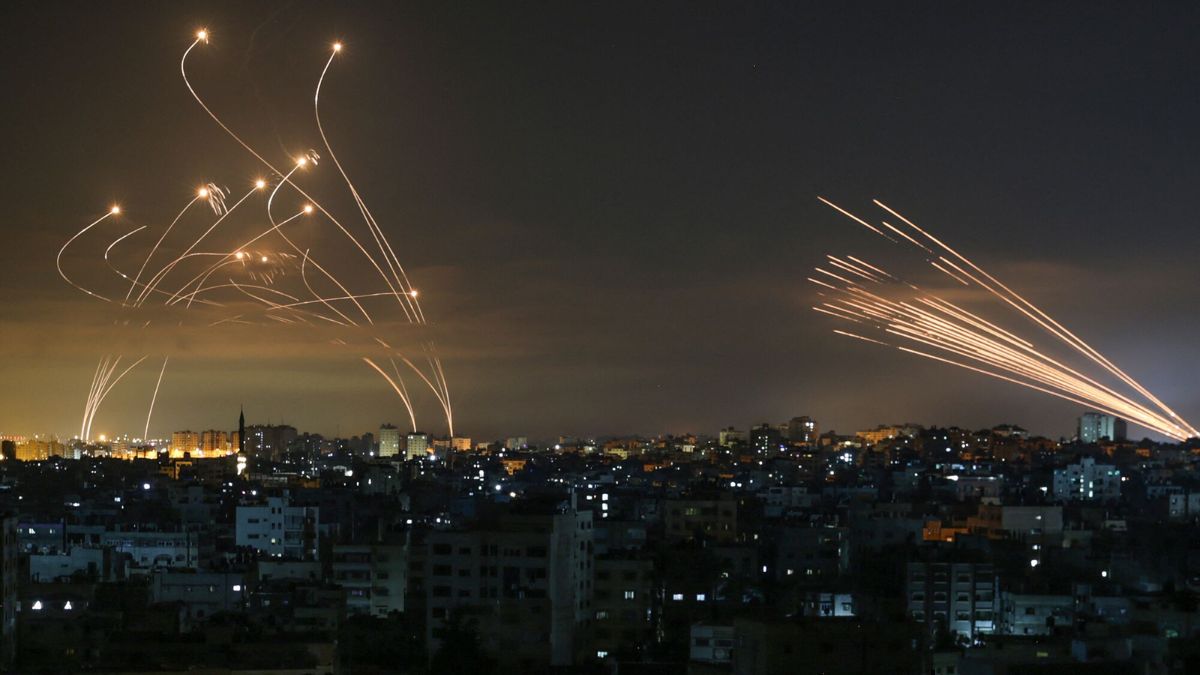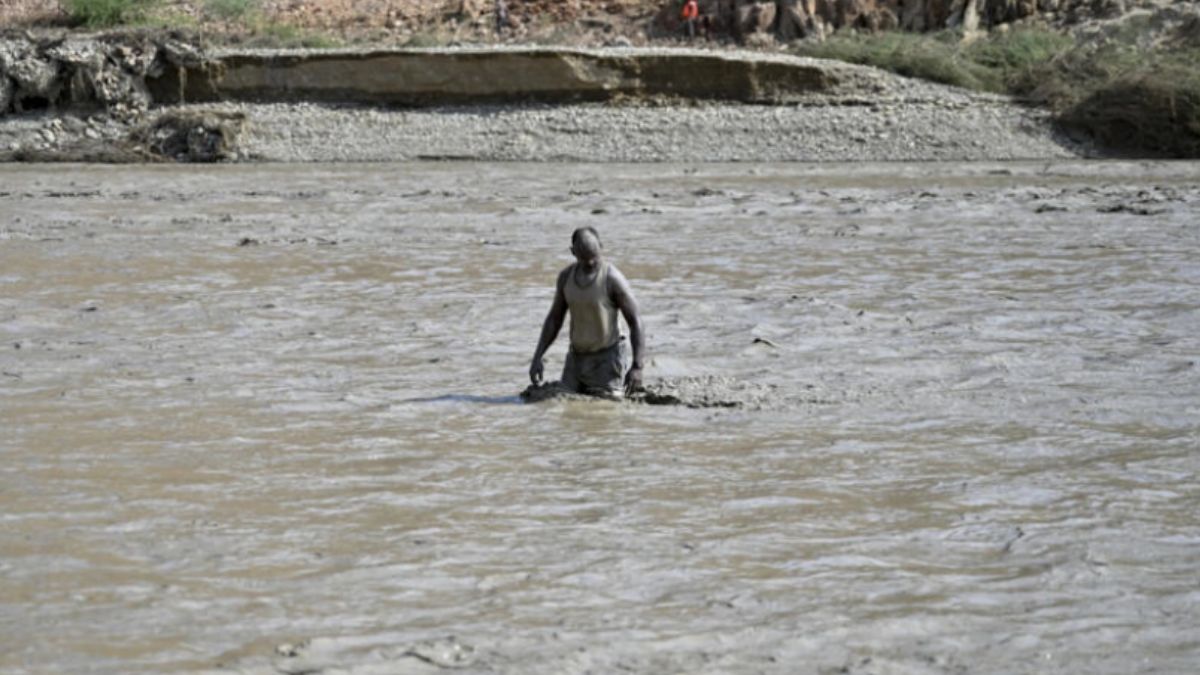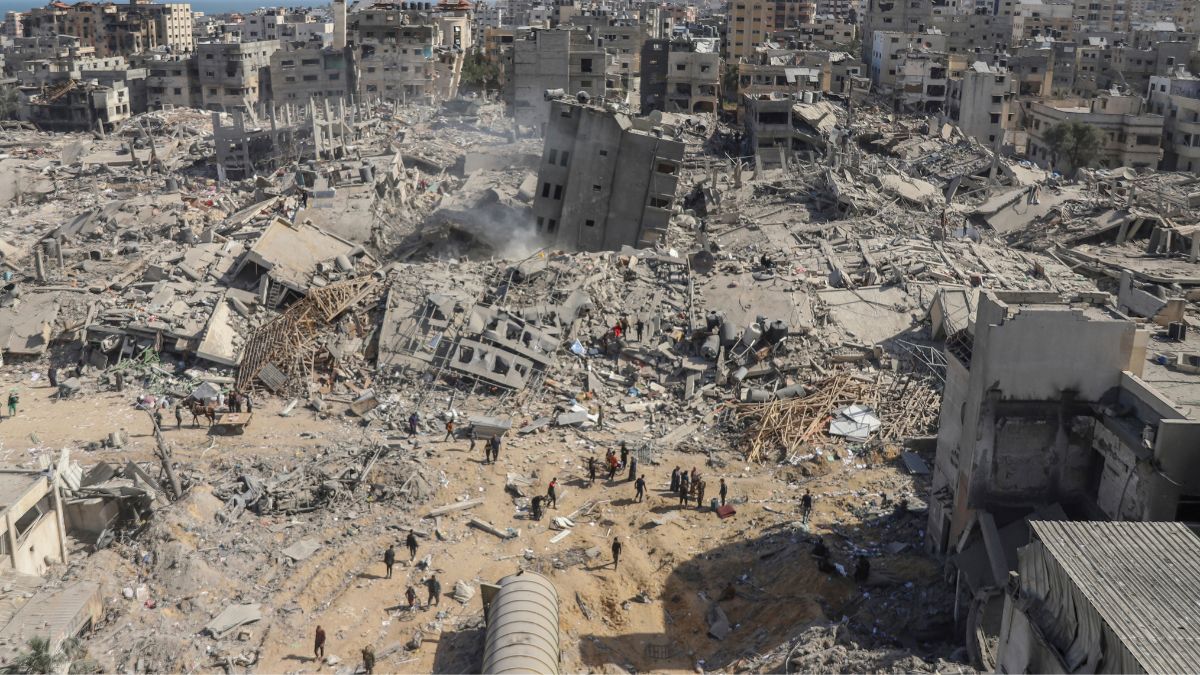Twice this year, a coalition of Arab and Western nations have come to Israel’s defence against Iranian barrages. As Israel marks one year of Hamas’ terrorist attack and messages of solidarity against terrorism pour in, is it Israel or Iran that stands isolated? read more
)
The Israeli Iron Dome missile defence system (left) intercepts rockets fired from Gaza Strip. (Representative Photo, Credit: Anas Baba/AFP)
Even as French President Emmanuel Macron called for an arms embargo on Israel, France joined the United States and United Kingdom to come to Israel’s defence against the Iranian ballistic missile attack last week. Jordan was also part of the efforts.
The same coalition, with the addition of Saudi Arabia, helped Israel in fending off the Iranian barrage in April as well.
Even as Israel faces mounting criticism at international forums like the United Nations (UN), the International Court of Justice (ICJ), and International Criminal Court (ICC), and public opinion turns sharply against the war in the Gaza Strip, the governments in the West as well as in the Arab world continue to support Israel when it really matters — fighting terrorists and Iran.
On the other hand, Iran finds itself not just cornered but also without friends in the Middle East. Hassan Nasrallah, the principal ally of Supreme Leader Ayatollah Ali Khamenei, is dead — so is the group’s entire leadership. Hezbollah has been battered in Lebanon and Hamas has been dealt major blows.
As the war in the Middle East completes a year, it may appear that Israel is more isolated than ever considering the criticism at multilateral forums and massive rallies in Europe and campus protests in the United States, but that’s not the case.
Alvite Ningthoujam, a scholar of Israeli and Middle Eastern affairs, tells Firstpost that the criticism of Israel has been very lukewarm in the Arab world.
“There is no boycott of Israel like 1973. Instead, apart from Jordan which has vehemently opposed Israeli actions, the reactions of Arab and Gulf countries have been very lukewarm. No country has cut ties with Israel and we have not seen anything apart from critical statements and condemnations. Had there been a reaction like the Yom Kippur War in 1973, when around a dozen African and Latin American countries snapped relations with Israel, there would have been a real dent in Israel’s international standing, but we have not seen anything like that,” says Ningthoujam, an Assistant Professor at the Symbiosis School of International Studies (SIS).
This is telltale of the changing dynamics among the Middle East’s rulers regarding Israel, says Ningthoujam.
Indeed, the dynamics are changing. A decade or two ago, the idea of Jordanian and Saudi militaries participating in a military operation for the defence of Israel would have been laughable. In the past year, we have seen them help Israel militarily against Iran twice.
Who is isolated & cornered — Israel or Iran?
Last month, the United Nations General Assembly (UNGA) voted overwhelmingly in favour of an end of Israeli occupation of Palestinian territories in the West Bank.
Since the beginning of the Middle East conflict last year with the Hamas’ attack on Israel on October 7, the recognition of Palestine has also increased and some countries have indeed cut or downgraded ties with Israel. It has also faced a tough time at ICJ and ICC. But that has not affected Israel as these countries —such as South Africa which filed the case in the ICJ— were never the ones Israel relied upon.
The Israeli relationship with South Africa had always been tense and, over the past year, it turned catastrophic, but Israel had already lost the battle for the public opinion in South Africa or other developing countries long back, so criticism from these countries does not affect Israel much, says Shaiel Ben-Ephraim, a US-based analyst of Israeli affairs and a broadcaster.
For a long time, the Israeli outlook has been quite existential. In a neighbourhood surrounded by what Israeli Envoy to India Reuven Azar called ‘Iran’s ring of fire’, Israel has always looked at relationships from the lens of survivalism. The relationships that matter are still strong.
“The Global South is definitely important, but Israel does not depend on those countries for survival. The countries that Israel depend on for survival, such as the United States and others in the West, have neither cut ties nor turned their backs on Israel. So, Israel has neither become isolated nor lost support,” says Ben-Ephraim, who hosts ‘Israel Explained’ and ‘History of the Land of Israel’ podcasts.
On the other hand, Iran appears to be losing key friends — even as allies Russia and China stand firmly with it.
Hamas has been reduced to a shadow of its former self —at least military— in Gaza and Hezbollah has been battered to the extent that its leadership is dead and some estimates say that nearly half of its war-waging capabilities have been dismantled. After the debacle last year, the Israeli intelligence and military apparatus have also regained the momentum and scored stunning successes across the region from Beirut to Tehran.
Not just friends, but Iran also appears to be losing its capabilities to hurt Israel. The threshold is now simply too high as Israel has already faced the worst terrorist attack ever and several thousands of Israelis have been displaced from northern part of the country for months amid near-daily attacks from Hezbollah in Lebanon. Now that Iran has mounted two direct aerial attacks as well, there are not many options with Iran to hurt Israel.
It is true that Iran has not sent all of its missiles at Israel, but it has sent its most-advanced missiles, and Israel and partners have shot down nearly all of them, notes Ben-Ephraim.
“I think Iran’s biggest nightmare is to face the reality that no matter what they do, they can’t hurt Israel badly, but Israel can hurt them quite a bit. They have already unleashed Hamas and Hezbollah against Israel and even though people talk about a regional war, the regional war is already here for Israel. It has been facing attacks from Gaza, Lebanon, Yemen, and even Iran directly. There is not much left for Iran to escalate to,” says Ben-Ephraim.
But Israel doesn’t have a rosy path ahead
Even though Israel appears to have the upper hand for now in the Middle East, the path ahead is not rosy and the situation may still turn against Israel.
For decades, Israel has had a major problem in turning military or intelligence successes in real political and strategic gains. As Israel wages war in Gaza and Lebanon, there is a risk for the repeat of the trend.
For one, even allies like the United States will not support the Israeli occupation of Gaza or Lebanon.
The support, as well as criticism, of Israel has become nuanced over the years. While countries condemn terrorism consistently, they oppose the continued Israeli occupation of Palestinian territories, including the . Any fresh occupation, whether in Gaza or Lebanon, would not add to Israel’s support but will attract fresh criticism — even from friendly nations.
For now, the lack of any real plan for the day after the war ends in Gaza is a major issue.
In the long-running Israeli-Palestinian conflict, the only internationally-recognised Palestinian body is the Palestinian Authority (PA), but Israel has not been cooperating with it and that leaves it with few good options in Gaza, notes Ningthoujam, the scholar of Israeli and Middle Eastern affairs at the Symbiosis School of International Studies (SIS).
Ningthoujam tells Firstpost, “Israel has said it does not want Hamas to run Gaza after the war, but it has also said no to PA running Gaza or a PA-Hamas consortium running Gaza after some reconciliation. There have been talks of a consortium of Arab nations taking over Gaza but nothing is known on that front so that leaves us with only two main Palestinian players: Hamas and PA. Considering the strained relationship between the UN and Israel, any UN initiative is also not practical. So, if not PA, then who gets to run Gaza after the war ends? The question has no answer as of now.”
Moreover, the weaker the PA gets, the stronger Hamas gets, so the weakening of PA is counter-productive for Israel, notes Ben-Ephraim.
As for the war, Ben-Ephraim tells Firstpsot that, as Israel has the momentun, it should now be looking forward to ending the war on its own terms before it’s too late.
“Right now, for the first time in this war, Israel seems to have something of a strategy. Israel’s blows to Hezbollah are now being matched with an escalation in northern Gaza and what Israel has told the hostage families is that what they’re hoping that within weeks they’ll be able to return to the negotiating table with a better position. This is Israel’s chance to end the war on its terms. Otherwise, I don’t think Israel can survive another year under this kind of economic and military strain and I don’t think international community will allow it to happen as well,” says Ben-Ephraim.
Madhur Sharma is a senior sub-editor at Firstpost. He primarily covers international affairs and India's foreign policy. He is a habitual reader, occasional book reviewer, and an aspiring tea connoisseur. You can follow him at @madhur_mrt on X (formerly Twitter) and you can reach out to him at [email protected] for tips, feedback, or Netflix recommendations see more

 1 month ago
9
1 month ago
9
)
)
)
)
)
)
)
)
)
)
)
)
)
)
)
)
)
)
)
)
)
)
)
)
)
 English (US) ·
English (US) ·